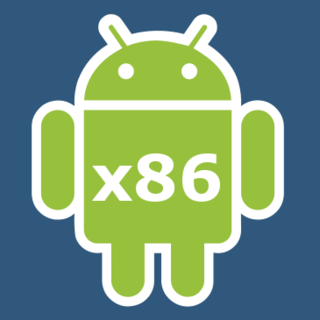
A Linux distribution is an operating system made from a software collection that includes the Linux kernel, and often a package management system. Linux users usually obtain their operating system by downloading one of the Linux distributions, which are available for a wide variety of systems ranging from embedded devices and personal computers to powerful supercomputers.

Sun Microsystems, Inc. was an American technology company that sold computers, computer components, software, and information technology services and created the Java programming language, the Solaris operating system, ZFS, the Network File System (NFS), and SPARC microprocessors. Sun contributed significantly to the evolution of several key computing technologies, among them Unix, RISC processors, thin client computing, and virtualized computing. Notable Sun acquisitions include Cray Business Systems Division, Storagetek, and Innotek GmbH, creators of VirtualBox. Sun was founded on February 24, 1982. At its height, the Sun headquarters were in Santa Clara, California, on the former west campus of the Agnews Developmental Center.

Solaris is a proprietary Unix operating system originally developed by Sun Microsystems. After the Sun acquisition by Oracle in 2010, it was renamed Oracle Solaris.

A live CD is a complete bootable computer installation including operating system which runs directly from a CD-ROM or similar storage device into a computer's memory, rather than loading from a hard disk drive. A live CD allows users to run an operating system for any purpose without installing it or making any changes to the computer's configuration. Live CDs can run on a computer without secondary storage, such as a hard disk drive, or with a corrupted hard disk drive or file system, allowing data recovery.

Network-attached storage (NAS) is a file-level computer data storage server connected to a computer network providing data access to a heterogeneous group of clients. The term "NAS" can refer to both the technology and systems involved, or a specialized device built for such functionality.

This is a list of operating systems specifically focused on security. Operating systems for general-purpose usage may be secure without having a specific focus on security.

PCLinuxOS, often shortened to PCLOS, is an x86-64 Linux distribution, with KDE Plasma Desktop, MATE and XFCE as its default user interfaces. It is primarily free software operating system for personal computers aimed at ease of use. It is considered a rolling release.
Technical variations of Linux distributions include support for different hardware devices and systems or software package configurations. Organizational differences may be motivated by historical reasons. Other criteria include security, including how quickly security upgrades are available; ease of package management; and number of packages available.
The Cobalt RaQ is a 1U rackmount server product line developed by Cobalt Networks, Inc. featuring a modified Red Hat Linux operating system and a proprietary GUI for server management. The original RaQ systems were equipped with MIPS RM5230 or RM5231 CPUs but later models used AMD K6-2 chips and then eventually Intel Pentium III CPUs for the final models.
Solaris Containers is an implementation of operating system-level virtualization technology for x86 and SPARC systems, first released publicly in February 2004 in build 51 beta of Solaris 10, and subsequently in the first full release of Solaris 10, 2005. It is present in illumos distributions, such as OpenIndiana, SmartOS, Tribblix and OmniOS, as well as in the official Oracle Solaris 11 release.

The Cobalt Qube was a computer server appliance product line, meant to be web servers, developed by Cobalt Networks, Inc. from 1998 to 2002 featuring a modified Red Hat Linux operating system and a proprietary GUI for server management. The original Qube systems were equipped with RM5230 or RM5231 microprocessors but later models used AMD K6-2 chips. NetBSD operating system has been ported to both the Cobalt Qube and RaQ.
Qube or Qubes may refer to:

Oracle VM VirtualBox is a type-2 hypervisor for x86 virtualization developed by Oracle Corporation. VirtualBox was originally created by InnoTek Systemberatung GmbH, which was acquired by Sun Microsystems in 2008, which was in turn acquired by Oracle in 2010.
The Sun Fire X4500 data server integrates server and storage technologies. It was announced in July, 2006 and is part of the Sun Fire server line from Sun Microsystems.

The TurnKey Linux Virtual Appliance Library is a free open-source software project which develops a range of Debian-based pre-packaged server software appliances. Turnkey appliances can be deployed as a virtual machine, in cloud computing services such as Amazon Web Services or installed in physical computers.

Android-x86 is an open source project that makes an unofficial porting of the Android mobile operating system developed by the Open Handset Alliance to run on devices powered by x86 processors, rather than RISC-based ARM chips.

Qubes OS is a security-focused desktop Linux distribution that aims to provide security through isolation. Virtualization is performed by Xen, and user environments can be based on Fedora or Debian, or Whonix, Ubuntu, Arch Linux, CentOS, or Gentoo among other operating systems; e.g. Qubes Windows Tools support Microsoft Windows 7 and later.

Ventoy is a free and open-source utility used for writing image files such as .iso, .wim, .img, .vhd(x), and .efi files onto storage media to create bootable USB flash drives. Once Ventoy is installed onto a USB drive, there is no need to reformat the disk to update it with new installation files; it is enough to copy the .iso, .wim, .img, .img(x), or .efi file(s) to the USB drive and boot from them directly. Ventoy will present the user with a boot menu to select one of these files.